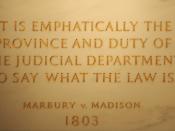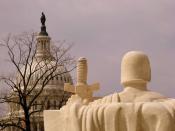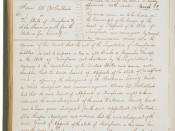The landmark case of McCulloch v. Maryland in 1819 unanimously ruled that the Constitution allowed Congress to establish the National Bank. The Court also asserted that the Constitution did not allow a state to tax the Bank. Chief Justice John Marshall stated that the Constitution does not explicitly grant Congress the right to establish a national bank, but also noted that the "necessary and proper" clause of the Constitution gives Congress the authority to do that which they felt was best for the country. Therefore, the Court affirmed the existence of implied powers.
In 1791, after Congress had passed the bill that established the First Bank of the United States, President George Washington had asked his cabinet for advice. He noted that although the Constitution lists the power of Congress, it does not mention the power to charter a bank. Yet the article does state that in addition to the listed powers, Congress may also make all laws that are "necessary and proper" for carrying out the listed powers.
In 1816, the Congress chartered the Second Bank of the U.S. The states generally opposed the National Bank, and several states passed laws that hindered it. They taxed branches of the Bank within their borders. When the Maryland branch of the Bank refused to pay the tax, Maryland sued the bank's cashier, James McCulloch. This issue was then brought to the Supreme Court.
Led by Chief Justice Marshall, The Supreme Court ruled that the Constitution allowed Congress to establish the National Bank. The Court also asserted that the Constitution did not allow a state to tax the bank. If the states could tax one of the federal government's activities, they could tax any of them. Marshall said that "the power to tax involves the power to destroy," and this could...


